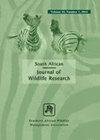Using a Binomial Mixture Model and Aerial Counts for an Accurate Estimate of Nile Crocodile Abundance and Population Size in the Kunene River, Namibia
引用次数: 7
Abstract
The Nile crocodile,Crocodylus niloticus, is found throughout sub-Saharan Africa, including Namibia, Botswana and Angola. The species was transferred from CITES Appendix I to Appendix II in 2004, although it is recognized as peripherally endangered in Namibia due to diminishing habitat availability primarily from human encroachment. In 2013, a species management plan was approved in Namibia to assess the management of the Namibian Nile crocodile populations. During 2012, an aerial survey was conducted to provide an estimate of Nile crocodile population numbers. A recently developed N-mixture model for estimation of abundance and spatial variation was used. Detection probability correlated to animal size and environmental covariates. Our data also suggest that small crocodiles are easier to detect during the spring. The abundance for different size classes was influenced by river complexity (vegetation, depth, channels) and the distribution of human settlements. An estimated 806 individuals were counted along the 352 km Namibian portion of the Kunene River system with a conservative estimate of 562 crocodiles regardless of size. The parameter estimates generated by the analysis suggested that the class-structured model can produce reliable estimates of total abundance and of local abundance for this section in the Kunene River system.利用二项混合模型和空中计数准确估计库内内河尼罗河鳄鱼的数量和种群规模
尼罗鳄(Crocodylus niloticus)遍布撒哈拉以南非洲,包括纳米比亚、博茨瓦纳和安哥拉。该物种于2004年从CITES附录I转移到附录II,尽管由于人类入侵导致栖息地减少,它在纳米比亚被认为是边缘濒危物种。2013年,纳米比亚批准了一项物种管理计划,以评估对纳米比亚尼罗鳄鱼种群的管理。2012年期间,进行了一次空中调查,以估计尼罗河鳄鱼的种群数量。本文采用了一种新建立的氮混合模型来估算丰度和空间变异。检测概率与动物大小和环境协变量相关。我们的数据还表明,小鳄鱼在春天更容易被发现。不同大小类的丰度受河流复杂性(植被、深度、河道)和人类住区分布的影响。据估计,在库内内河系统的纳米比亚部分352公里处,估计有806条鳄鱼,保守估计有562条鳄鱼,无论大小。分析得到的参数估计值表明,类结构模型可以可靠地估算库内河水系该断面的总丰度和局部丰度。
本文章由计算机程序翻译,如有差异,请以英文原文为准。
求助全文
约1分钟内获得全文
求助全文

 求助内容:
求助内容: 应助结果提醒方式:
应助结果提醒方式:


